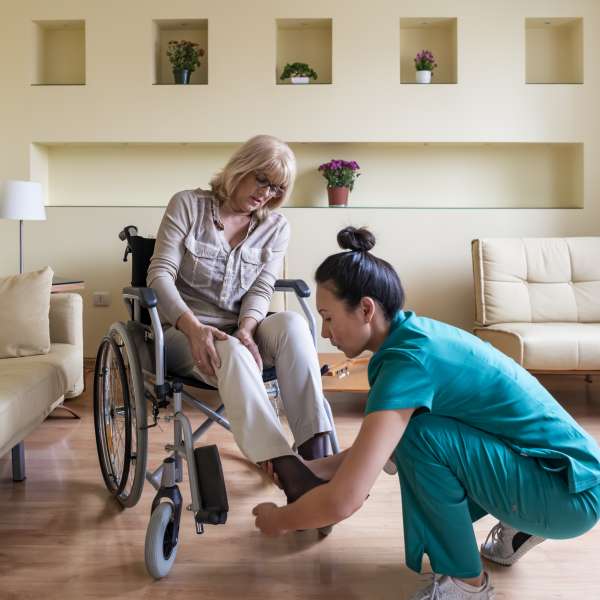Home health aides are an essential part of the healthcare world. They are often the first point of contact for patients and families, providing one-on-one care to those that need it most. There are many reasons to consider a home health aide career, from a positive job outlook to making a difference in people’s lives.

What is a home health aide?
Home health aides (HHA) help patients with disabilities, chronic illness, cognitive impairment, and the elderly with daily living activities and some medical care. The assistance you provide helps these people safely live in their own homes with dignity.
As a home health aide, you will help patients with everyday tasks such as:
- Bathing and grooming
- Toileting
- Dressing
- Meals and eating
- Light housekeeping
- Checking and documenting vital signs
- Providing medical treatments following instructions from a doctor or nurse
There are many reasons to become an HHA. Here are five key motives that you may consider:
1. Job outlook is excellent
Recent data from the Bureau of Labor Statistics paints a positive picture for aspiring home health and personal care aides. Job growth is projected to grow by 33% between 2020 and 2030, much faster than the 8% average growth for all fields.
2. It’s an excellent way to start your career in healthcare
Entering the home healthcare field is relatively easy. Home health aides usually need only a high school diploma or equivalent education. To become a certified HHA, you will likely need to complete formal training and pass an exam. However, this training is usually completed in a matter of weeks.
3. You can connect with your patients
Home health aides often work closely with just a few patients. This makes it easier to get to know each patient and develop trust. Though you are primarily there to provide them with practical and medical help, you may also support their mental health by providing company and companionship. You might become a trusted confidant, a shoulder to cry on, or a bright spot in their day.
4. You can make a real impact in families’ lives
Caring for a loved one, though important, is also challenging. Home health aides often support more than just the patient, becoming an essential part of their family’s lives as well. You may give a spouse, parent, or child time to relax and focus on their wellbeing, knowing that their loved one is in professional and caring hands. This can be life-changing for family caregivers and those they love.
Insurance for Home Health Aides
Thinking about starting your home health aide career? In addition to your training, it’s important to consider insurance. From slipping over and injuring yourself in a client’s home to mistakenly giving a patient the wrong medication, there are many potential risks at work.
Protect yourself with insurance for home health aides from BizInsure. Compare quotes from leading insurers today!
© Copyright 2024 BizInsure LLC, 2015 ALL RIGHTS RESERVED BizInsure LLC; CA DBA: Simple, Smart, BizInsure Insurance Agency LLC; NY DBA: BizInsure Services LLC; NH DBA: Simple, Smart, BizInsure Insurance Agency; PA DBA: BizInsure Services LLC. 2950 Buskirk Ave Suite 300, Walnut Creek CA 94597. License #0H81929



